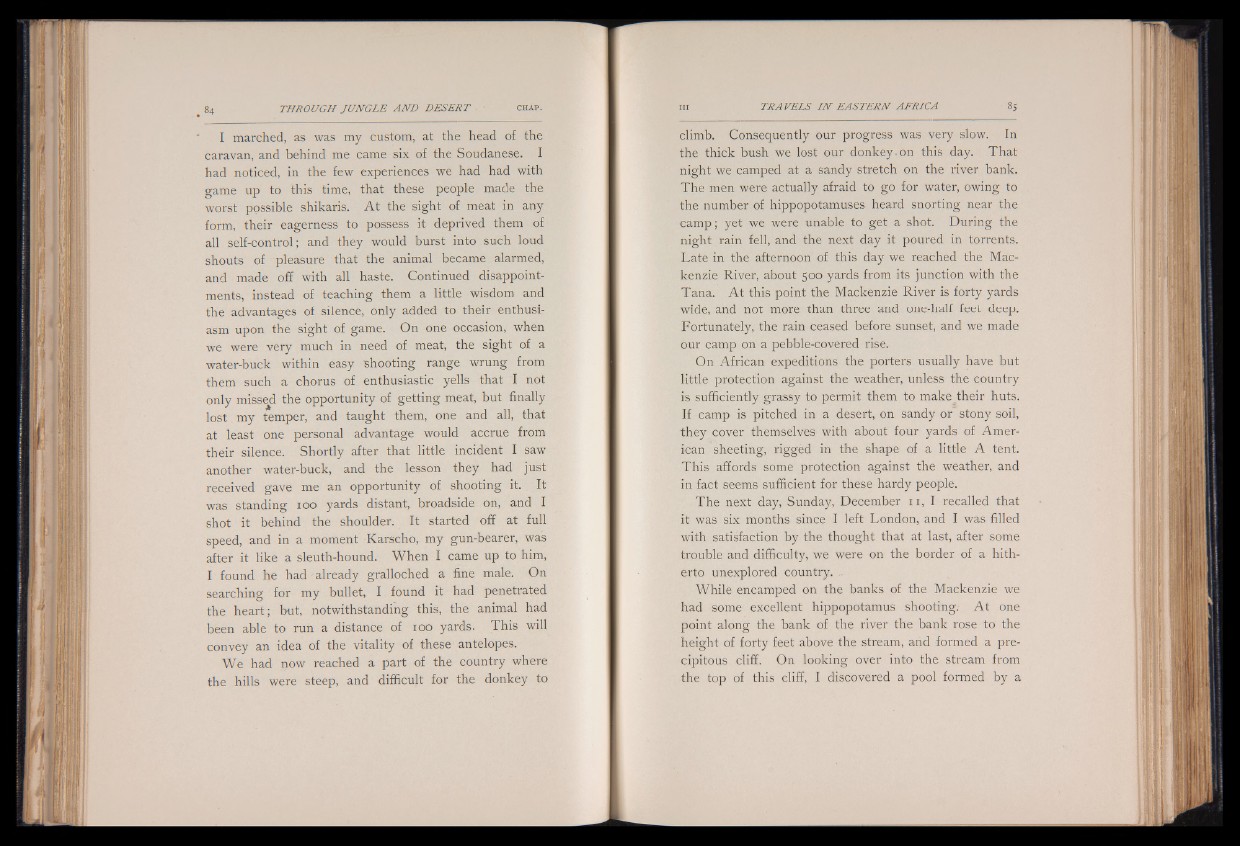
I marched, as was my custom, at the head of the
caravan, and behind me came six of the Soudanese. I
had noticed, in the few experiences we had had with
game up to this time, that these people made the
worst possible shikaris. A t the sight of meat in any
form, their eagerness to possess it deprived them of
all self-control; and they would burst into such loud
shouts of pleasure that the animal became alarmed,
and made off with all haste. Continued disappointments,
instead of teaching them a little wisdom and
the advantages of silence, only added to their enthusiasm
upon the sight of game. On one occasion, when
we were very much in need of meat, the sight of a
water-buck within easy shooting range wrung from
them such a chorus of enthusiastic yells that I not
only missed the opportunity of getting meat, but finally
lost my temper, and taught them, one and all, that
at least one personal advantage would accrue from
their silence. Shortly after that little incident I saw
another water-buck, and the lesson they had just
received gave me an opportunity of shooting it. It
was standing 100 yards distant, broadside on, and I
shot it behind the shoulder. It started off at full
speed, and in a moment Karscho, my gun-bearer, was
after it like a sleuth-hound. When I came up to him,
I found he had already gralloched a fine male. On
searching for my bullet, I found it had penetrated
the heart; but, notwithstanding this, the animal had
been able to run a distance of 100 yards. This will
convey an idea of the vitality of these antelopes.
We had now reached a part of the country where
the hills were steep, and difficult for the donkey to
climb. Consequently our progress was very slow. In
the thick bush we lost our donkey.on this day. That
night we camped at a sandy stretch on the river bank.
The men were actually afraid to go for water, owing to
the number of hippopotamuses heard snorting near the
camp; yet we were unable to get a shot. During the
night rain fell, and the next day it poured in torrents.
Late in the afternoon of this day we reached the Mackenzie
River, about 500 yards from its junction with the
Tana. A t this point the Mackenzie River is forty yards
wide, and not more than three and one-half feet deep.
Fortunately, the rain ceased before sunset, and we made
our camp on a pebble-covered rise.
On African expeditions the porters usually have but
little protection against the weather, unless the country
is sufficiently grassy to permit them to make their huts.
If camp is pitched in a desert, on sandy or stony soil,
they cover themselves with about four yards of American
sheeting, rigged in the shape of a little A tent.
This affords some protection against the weather, and
in fact seems sufficient for these hardy people.
The next day, Sunday, December 11, I recalled that
it was six months since I left London, and I was filled
with satisfaction by the thought that at last, after some
trouble and difficulty, we were on the border of a hitherto
unexplored country. ,.
While encamped on the banks of the Mackenzie we
had some excellent hippopotamus shooting. A t one
point along the bank of the river the bank rose to the
height of forty feet above the stream, and formed a precipitous
cliff. On looking over into the stream from
the top of this cliff, I discovered a pool formed by a